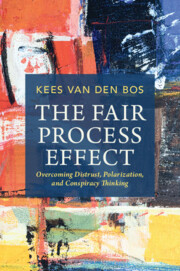Book contents
- The Fair Process Effect
- The Fair Process Effect
- Copyright page
- Contents
- Preface
- Acknowledgments
- Part I Introduction
- Part II Perceiving Procedural Fairness
- Part III The Fair Process Effect
- Part IV Examining Societal Discontent
- Chapter 6 Distrust
- Chapter 7 Polarization
- Chapter 8 Conspiracy Thinking
- Part V Overcoming Societal Discontent
- References
- Index
Chapter 8 - Conspiracy Thinking
from Part IV - Examining Societal Discontent
Published online by Cambridge University Press: 26 October 2023
- The Fair Process Effect
- The Fair Process Effect
- Copyright page
- Contents
- Preface
- Acknowledgments
- Part I Introduction
- Part II Perceiving Procedural Fairness
- Part III The Fair Process Effect
- Part IV Examining Societal Discontent
- Chapter 6 Distrust
- Chapter 7 Polarization
- Chapter 8 Conspiracy Thinking
- Part V Overcoming Societal Discontent
- References
- Index
Summary
Chapter 8 studies what we can do so that people do not fall into traps of trying to believe in conspiracy theories that resist falsification. Belief in conspiracy theories often starts by looking at important societal authorities and a certain amount of suspicion about these authorities. The chapter examines when conspiracy thinking feels so good that people exaggerate their levels of suspicion of what is actually going on in society. The chapter also explains how the online quality of our modern way of living tends to amplify levels of suspicion and the ease with which conspiracy theories are spread. The chapter distinguishes between three different motivations that often are equated with each other, yet that drive conspiracy thinking in different ways. One important motivation is epistemic and concerns people trying to make sense of what is going on in their world. Another important motivation is existential and concerns people trying to deal with threats in their life. Yet another motivation concerns group identification. This includes people wanting to belong to unique groups that give them a sense of belonging. The three motivations point out different ways of trying to intervene when people start falling for exaggerated suspicion and conspiracy thoughts.
Keywords
- Type
- Chapter
- Information
- The Fair Process EffectOvercoming Distrust, Polarization, and Conspiracy Thinking, pp. 89 - 102Publisher: Cambridge University PressPrint publication year: 2023

